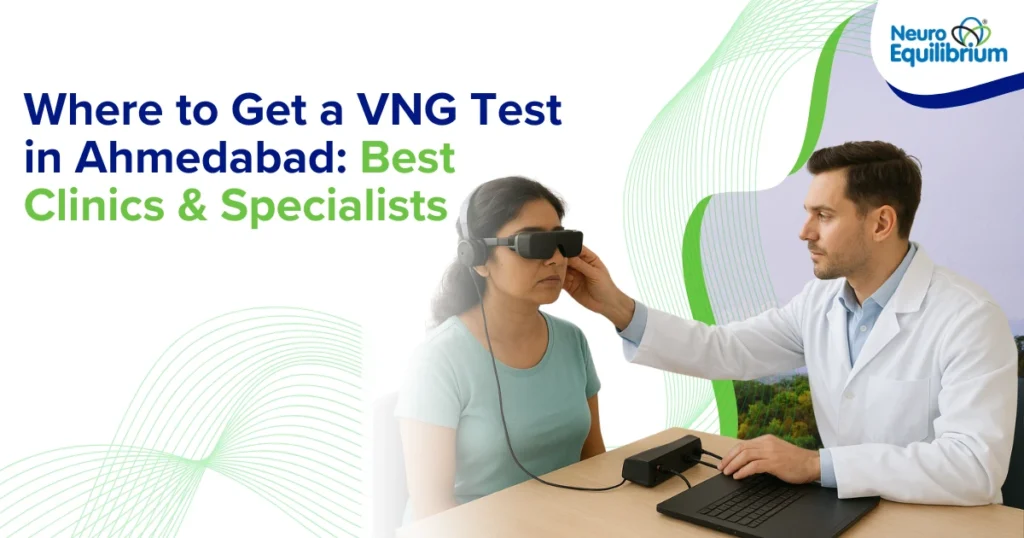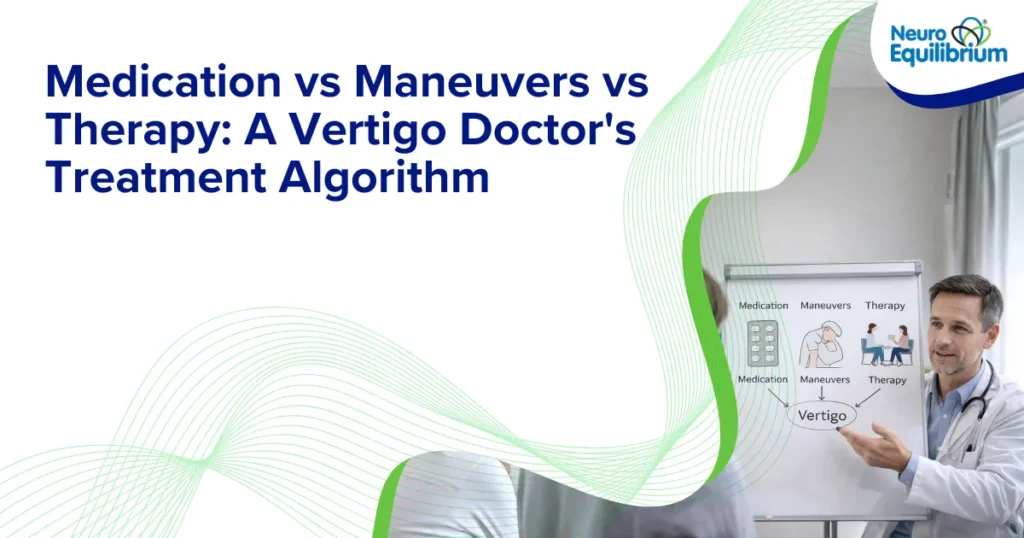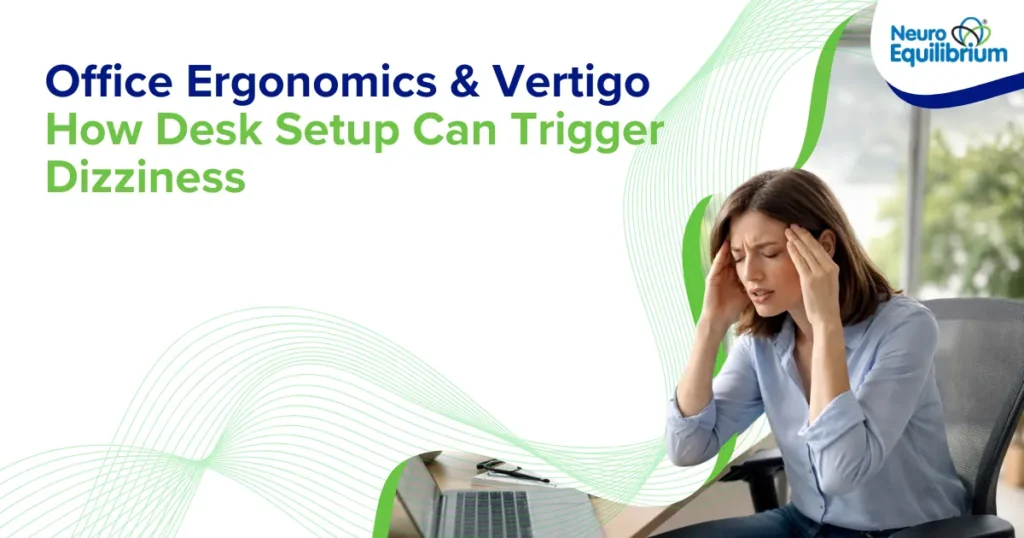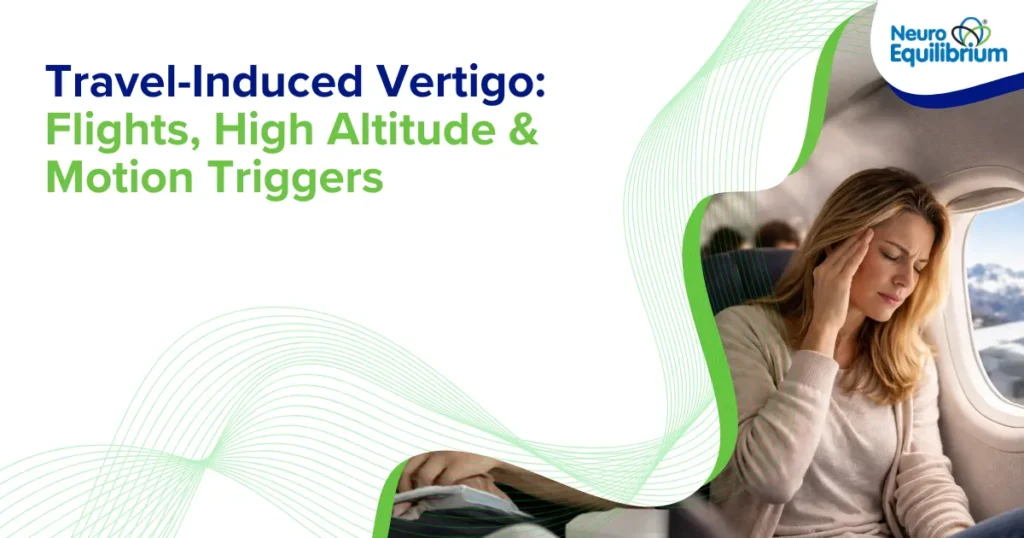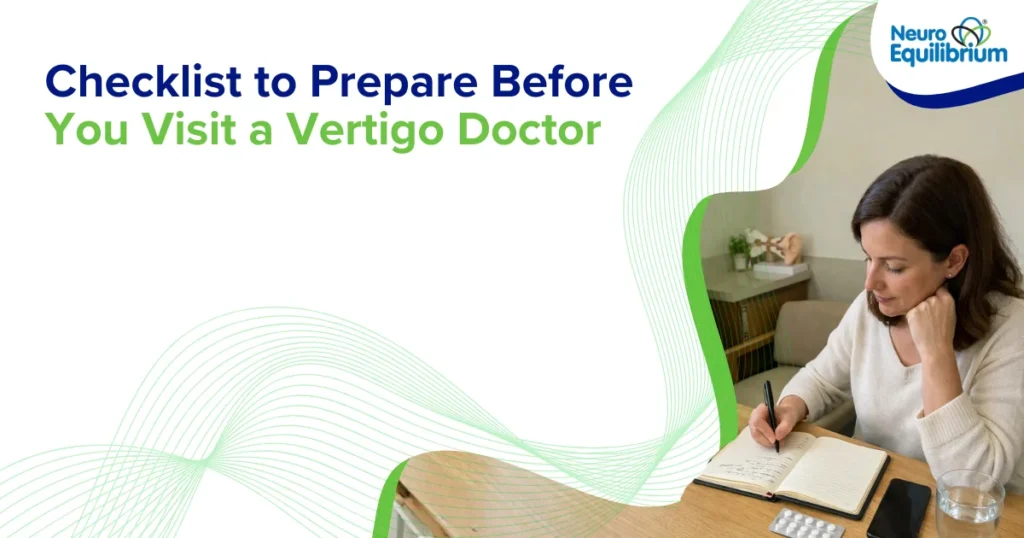Being dizzy here and there may not be a big issue but when it persists, it may be quite uncomfortable. When you are unable to stay straight or feel like you are spinning, it could be an indication of something wrong with your inner ear or your balance system. It is at this point that special examinations such as VNG (Videonystagmography) may be of assistance. These examinations will provide physicians with a better understanding of your balance and assist them in selecting the most appropriate treatment alternatives.
At NeuroEquilibrium Clinics in Ahmedabad, we perform these detailed tests, such as VNG, DVA, VEMP, and Posturography, ensuring patients get a thorough examination tailored to their needs.
What is a VNG Test?
Videonystagmography (VNG) is a helpful diagnostic test that looks at your eye movements to assess how well your balance system is working. It uses infrared cameras in special goggles to gently observe involuntary eye movements called nystagmus. By examining these movements, we can see how your brain and inner ear work together to keep you balanced. The VNG test is prescribed in case patients have:
- Symptoms of vertigo: the feeling that the room is revolving around you.
- Difficulty in walking straight: even when standing still, may be unsteady.
- Constant dizziness: a floating experience rather than a lightheadedness that does not resolve with rest.
- Tinnitus, characterized by ringing or buzzing in the ears, often accompanies balance issues.
The test is non-invasive, safe, and can be completed in around an hour. It assists the specialists to identify whether the problem is within the inner ear, the nerve of the vestibular or the central balance pathways within the brain by triggering the inner ear using various movements and visual stimuli.
Know More About Vertigo Tests
- VNG Test: Meaning, Procedure, and Results Explained
- Vertigo Test Cost in Bangalore: VNG, DVA, SVV & More
- Difference Between VEMP and VNG Test for Vertigo Diagnosis
Types of Vestibular Tests in Ahmedabad
Although VNG is the most commonly prescribed test, balance and dizziness tests and assessments often incorporate a battery of additional specialized diagnostic tests. The following tests are provided at NeuroEquilibrium Ahmedabad clinics:
1. Videonystagmography (VNG)
- Registers the eye movement when there is a visual and positional variation.
- Monitors any abnormal response of the vestibular disorders.
- Taken as the gold standard of vertigo diagnosis.
2. Dynamic Visual Acuity (DVA)
- Tests the range of your vision when your head is moving.
- This is of significance to individuals who experience their vision shaking or getting hazy as they walk or swivel their head around.
3. Subjective Visual Vertical (SVV)
- Practice your perception accuracy of upright and tilted poses.
- Useful in detecting those cases in which balance perception is distorted.
4. Caloric Testing
- Evaluates how each inner ear (vestibular organ) responds to temperature stimulation.
- Helps identify if dizziness or vertigo is caused by reduced function in one ear.
- Considered a key component in diagnosing balance disorders and unilateral vestibular weaknesses.
Together, these tests provide a detailed picture of how your vestibular system is functioning.
When Should You Get a VNG Test?
Not every episode of dizziness requires testing. However, you should seek a balance test if:
- Continued symptoms: In case of dizziness, which continues after several days or recurs.
- Unexplained imbalance: The inability to walk straight without an apparent cause.
- Falls: You lose control so quickly that you are at risk of hurting yourself.
- Recurring vertigo: The feeling of rotating due to the movement of the head.
- Tinnitus and loss of balance: The patient experiences constant ear buzzing and a sense of loss of balance.
These symptoms can sometimes be overlooked, which might delay getting the help you need. Catching issues early can make a big difference, especially for conditions like Benign Paroxysmal Positional Vertigo (BPPV), Meniere’s Disease, or Vestibular Neuritis. Early detection means we can often treat these conditions more effectively.

Why Choose NeuroEquilibrium in Ahmedabad?
NeuroEquilibrium is one of India’s largest networks of clinics dedicated to balance and dizziness disorders. In Ahmedabad, patients benefit from:
- Elite Technology: Clinics will be equipped with the latest diagnostic equipment such as VNG, Caloric testing platforms.
- Professionally Trained: Doctors specialize in treating only the vestibular disorders, so the care is directed.
- Patient-Centric Care: Tests are described step-by-step in order to make patients aware of what to anticipate.
- Standardized Protocols: Clinical outcomes of Ahmedabad clinics are compared to international standards, so the results are accurate.
- Accessibility: It has two clinic locations in different parts of the city, which makes it convenient to patients.
Clinic Locations in Ahmedabad
1. NeuroEquilibrium Clinic – Drive In Road
- Location: Drive In Cinema Road, Ahmedabad, Gujarat
- Pincode: 380054
- Ideal for patients living in the western part of the city.
2. NeuroEquilibrium Clinic – Maninagar
- Location: Maninagar, Ahmedabad, Gujarat
- Pincode: 380028
- Convenient for patients residing in the eastern and southern zones.
Both clinics follow the same diagnostic protocols and are staffed by trained specialists.
Book Your VNG Test Today
If dizziness or imbalance is affecting your life, don’t wait. The first step toward relief is accurate diagnosis. Book your VNG test at NeuroEquilibrium Ahmedabad today.
Which test is best for diagnosing vertigo?
VNG is mostly selected as it directly measures eye and balance. It can also be used along with DVA or SVV, Caloric testing in an attempt to provide a comprehensive view to the doctors.
How long does the VNG test take?
Most of the patients spend between 60-90 minutes taking the test.
Is the VNG test uncomfortable?
The test is well-tolerated and non-invasive in nature. Some of the sections may induce mild dizziness in some of the patients but the symptoms quickly disappear.
Do I need to prepare for the test?
To give the most accurate results, physicians normally recommend caffeine, alcohol, and some drugs to be avoided before the test. This will aid in avoiding any form of interference and it will be easier for you.






